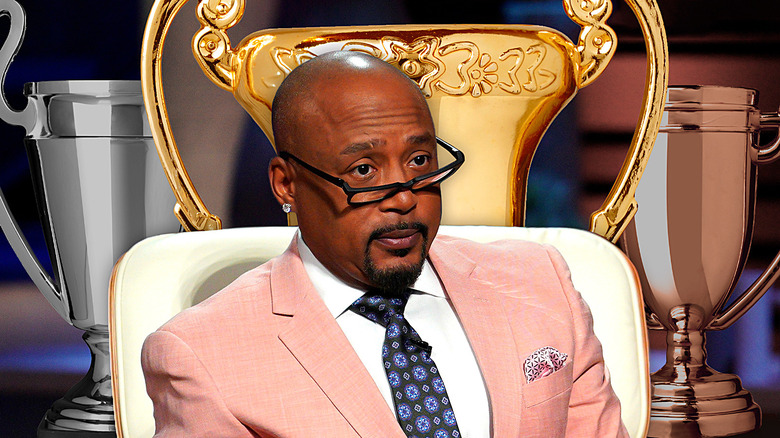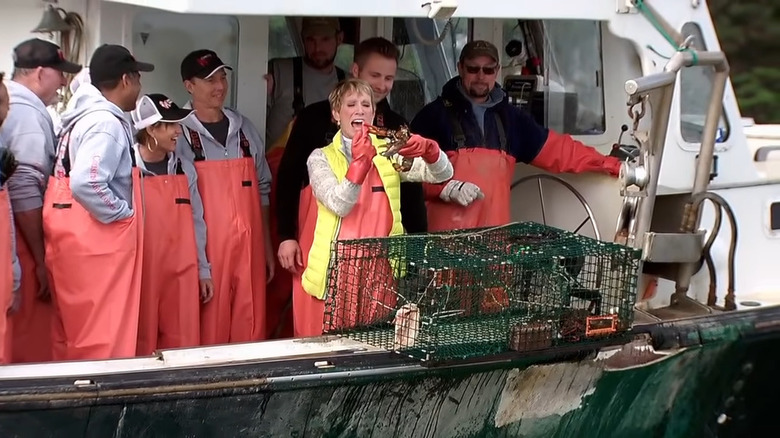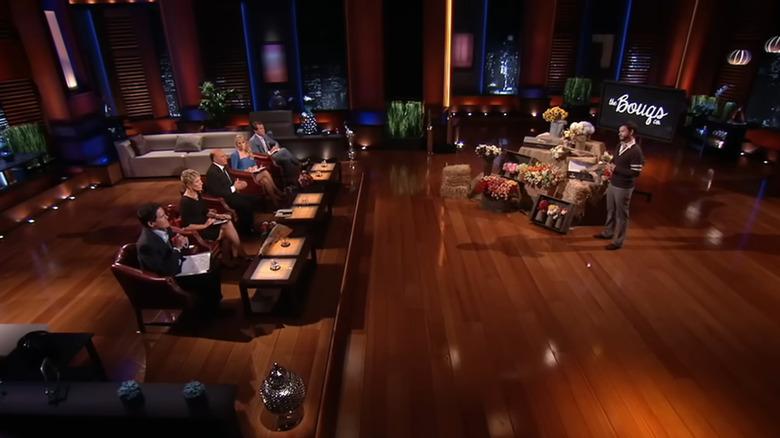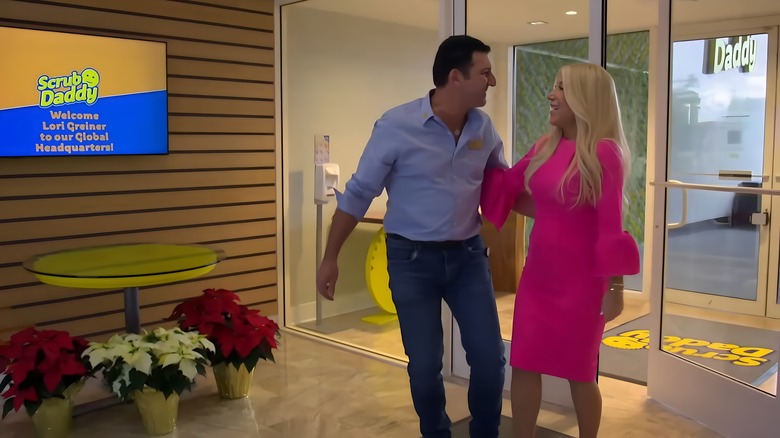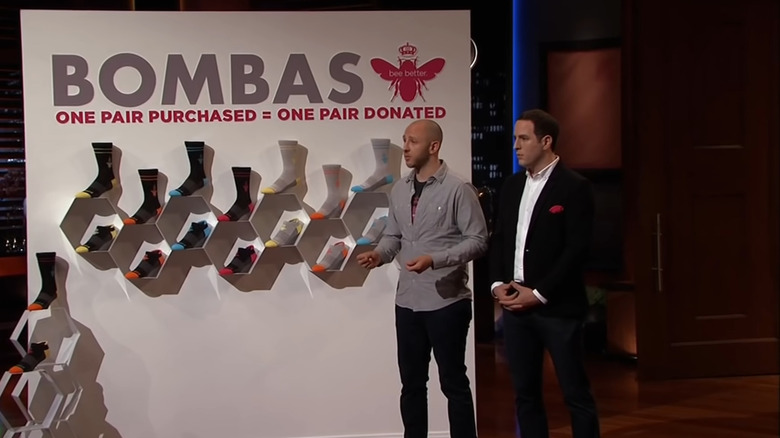Shark Tank's Top 5 Highest Grossing Companies, According To ABC
We're well into "Shark Tank" Season 15, and fans of the long-running ABC reality series have already taken in their fair share of impressive deals and off-the-wall products. From Pumpkin Carvers to Krapp Strapps, the program has proven once more that if there's a need — no matter how seemingly small or obscure — somebody somewhere has tried to fill it. That doesn't mean everyone is successful.
Many "Shark Tank" products wind up evaporating entirely, fading from memory with only their 15 minutes of fame as evidence of their existence (and let's not forget that about one in four "Shark Tank" pitches never make it to air). Even those lucky enough to land a deal with one of the five celebrity investors on the panel face an arduous closing process that very often ends with the deal falling apart.
All this to say, it's even more impressive than that, since debuting in 2009, over a thousand deals have been made for hundreds of millions of dollars. Some of these deals have resulted in only moderate growth — but some have sold hundreds of millions and even billions of dollars worth of product. Here are the five companies that have enjoyed the most post-"Shark Tank" success, as counted down in Season 15, Episode 5 of the show on October 27, 2023.
5. Cousins Maine Lobster
One of the best episodes of "Shark Tank" featured Cousins Maine Lobster Truck, a culinary company that's pretty self-explanatory (except for the fact that they were originally based in Los Angeles, California, of all places). When Sabin Lomac and Jim Tselikis sought a $55,000 investment on the show (in exchange for 5% of the business) all the way back in 2012, they had done $150,000 in sales in the span of just two months. They accepted a deal with Barbara Corcoran — $55,000 for 15%.
Eleven years later, Cousins has grossed $585 million in lifetime sales. According to a recent interview with QSR, the Portland, Maine-based family-run business has expanded to include 36 food trucks and seven restaurants across the country. Even so, the founders are dedicated to keeping the quality consistent through all franchises, with Tselikis telling the outlet last year, "We make sure that the food is coming to [franchisees] cooked and prepared the same way, same quality, same specs from our teams so that we can all then ultimately use that in a lobster roll, into a lobster quesadilla, into a lobster taco, so that the experience for the customer is the same every time."
4. The Bouqs Company
A season after Cousins Maine Lobster made a splash in the "Shark Tank," entrepreneur John Tabis waltzed in with an out-of-the-vase approach to delivering flowers: The Bouqs Company. Though Tabis' business had made $700,000 in its first year, the high buy-in price of $285,000 (in exchange for just 3% equity, no less) combined with the $1.1 million in seed capital Tabis raised at a daunting $5.2 million valuation made Bouqs seem entirely un-investible to all five Sharks present.
Yet despite the fact that Tabis walked out of the Tank without a deal, Bouqs went on to become one of the most successful "Shark Tank" companies ever. To date, the service has generated $640 million in lifetime sales, and was described by CNBC in 2022 as one of the rare "Shark Tank MISSES." Five years after Bouqs' appearance on the show, none other than Robert Herjavec himself hired the service in lieu of a florist for his wedding and was shocked at the amount of money he saved. Mark Cuban, meanwhile, told ABC News in 2017 that Bouqs was "the one [deal] I regret not doing, 'cause that's a deal I would've loved."
3. Scrub Daddy
Likely one of the everyday things you didn't know got its start on "Shark Tank," Scrub Daddy was a smash hit on the series when it appeared on an episode during Season 4. This was thanks in large part to Aaron Krause, the Billy Mays-esque founder-inventor of the smiling sponge, an individual whose electric enthusiasm is seldom matched by other "Tank" entrepreneurs. Despite Mark Cuban, Robert Herjavec, and Kevin O'Leary essentially going out one after the other, Daymond John and Lori Greiner still triggered a feeding frenzy. Scrub Daddy entered the Tank seeking $100,000 in exchange for 10% and left with $200,000 in exchange for 20%.
At the time, Krause was able to boast sales "just north of $100,000" after four months in operation. Today, Scrub Daddy's lifetime sales amount to $926 million. In 2022, Krause was invited to participate in a "Shark Tank Update" segment, in which he shared, "When I pitched to the sharks, we only had $100,000 in retail sales and one product, and now in 10 years the company has 273 employees, we have 160 products, and we're sold in 257,000 retail locations."
2. Everly Health (Everlywell)
During Season 9 of "Shark Tank," Julia Cheek brought her wellness company Everlywell before the investment panel. Its stated goal was to improve the medical testing industry by providing at-home alternatives in supermarkets and retail stores. Cheeks' initial valuation was $20 million (5% of the company carried a $1 million price tag). Lori Greiner circumvented her ask, however, by coming up with a creatively protective offer after the other four Sharks went out: 5% in exchange for a $1 million line of credit at an 8% interest rate. Cheeks accepted the offer without so much as a counter.
Today, Everlywell — now Everly Health — services 20 million people per year (according to their website) and has done over $1.1 billion in sales. Cheeks was featured alongside her company in a follow-up segment during Season 11, which confirmed that she and Greiner had successfully closed their deal and gone into business with one another.
1. Bombas Socks
Of the over 1,100 companies seen and $220 million pledged on "Shark Tank," Bombas Socks is the best-selling product to come out of a Shark Tank deal so far and is certainly the most successful too. Originally sold at a $9 price point, its mission (in addition to providing a superior athletic sock) was to donate a pair of socks for each pair sold. Even with its charitable efforts, Bombas managed to do $450,000 in sales by the time it appeared on the show.
And yet, because of its $4 million valuation, many of the Sharks reacted harshly toward their pitch, with Kevin O'Leary even stating that he would "forbid" anyone on the panel from investing at those terms. With just Daymond John left in the Tank, Bombas brought the valuation down to $2 million just for him — John countered for $1 million. After some tense negotiations (which saw John deny them the opportunity to call their CFO), they finally agreed on a deal of $200,000 for 17.5%.
As of Season 15, Bombas Socks have sold $1.3 billion worth of product. Their line has expanded to include other types of athleticwear, including T-shirts and even underwear. In 2023, John revisited the pitch on his YouTube channel (wearing a "big-a** hat") and stated that he's just as excited about the deal today as he was when he made it; that's because they've given away over 100 million units of garments to people in need since then.
